Introduction
The role of the Chief Financial Officer (CFO) has undergone a remarkable transformation. Once limited to accounting and compliance, today's CFOs are key strategic leaders driving business direction. This shift is propelled by the complex financial landscapes companies navigate and the increasing integration of technology, particularly AI and automation, into financial operations.
A survey by Sage reveals that a significant majority of CFOs recognize the impact of these technologies on their roles, with many anticipating revenue growth driven by AI. This embrace of technology allows CFOs to transcend their traditional responsibilities, offering deeper insights and guiding business strategies with greater flexibility.
The evolution of the CFO's role is not just theoretical but exemplified by industry leaders like Harmit Singh of Levi Strauss, who has expanded from financial management to also driving business growth. This trend is echoed across the industry, with CFOs honing critical skills in leadership, problem-solving, and technology. Research by PwC further illustrates that companies at the forefront of evolving their business and technology models achieve substantial performance gains.
As CEOs anticipate significant shifts due to technological advancements and changing customer preferences, the modern CFO emerges as a dynamic strategist, pivotal in steering their organizations towards future success.
The Evolution of the CFO Role
The evolution of the Chief Financial Officer (CFO) role has been profound. 'No longer confined to the realms of accounting and compliance, today's chief financial officers are pivotal strategic leaders influencing business direction.'. This transformation is driven by the increasingly complex financial landscapes organizations navigate. A survey by Sage of over 1,200 finance leaders across various industries, including tech, healthcare, and retail, underscores this shift. It discovered that 86% of finance executives believe technology, especially AI and automation, will significantly impact their roles, with 79% asserting that AI will drive revenue growth.
This technological embrace is not merely about operational efficiency; it's about reshaping the strategic landscape. Steve Hare, CEO of Sage, states, "Merging finance with technology provides financial leaders the opportunity to go beyond their conventional functions, steering their organizations with both adaptability and greater understanding." This understanding is essential as chief financial officers are expected to utilize technology to increase their impact within the enterprise, aligning fiscal objectives with wider organizational strategies.
'The role’s expansion is illustrated by Harmit Singh of Levi Strauss, who shifted from concentrating solely on financial management to also leading growth as Chief Growth Officer.'. This shift reflects a broader trend where CFOs develop critical skills in leadership, problem-solving, and technology understanding, with 78% of finance leaders identifying these as essential for future success.
Moreover, PwC research highlights that top companies continuously evolve their operational and technology models, capturing significant performance premiums. This evolution is essential as CEOs anticipate substantial impacts from technological advancements and shifting customer preferences in the coming years.
In summary, the modern CFO is a dynamic strategist, skilled at harnessing technology to navigate monetary and operational complexities. This expanded role not only positions financial executives as key business leaders but also as architects of their organizations' futures.
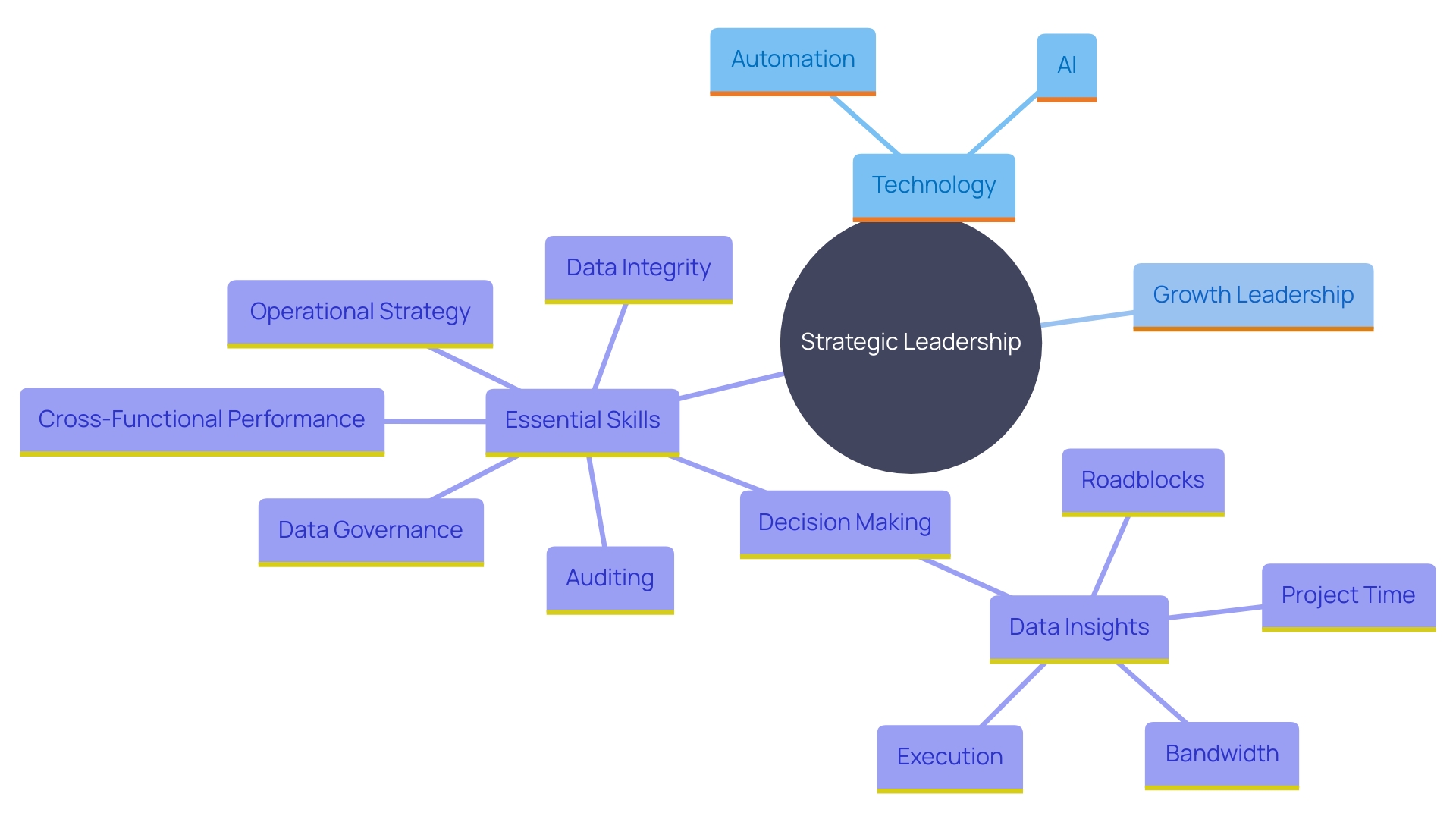
Key Responsibilities of a CFO
Contemporary chief financial officers face a varied range of duties that greatly exceed conventional budget management. They are not only assigned to supervise planning, budgeting, and forecasting processes but also to handle cash flow and liquidity to guarantee the availability of funds for both daily operations and future investments. The role now demands a strategic edge, requiring chief financial officers to prepare and present comprehensive financial reports, including monthly, quarterly, and annual statements, to the executive team and board of directors.
In today’s complex business environment, financial executives must develop and maintain robust internal controls, risk management policies, and compliance procedures to meet increasingly stringent regulatory requirements. According to Thomson Reuters, the volume and complexity of regulatory changes are expected to grow, presenting significant challenges for finance and accounting teams. This necessitates that finance leaders and their teams stay ahead of the curve to prevent the company from being jeopardized.
Furthermore, the modern CFO is integral to driving operational efficiency and strategic decision-making. By collaborating closely with external stakeholders such as auditors, tax advisors, and financial organizations, chief financial officers offer invaluable economic insights and support. This collaboration ensures that financial strategies are aligned with the organization’s long-term goals. Internally, financial leaders guide and cultivate their finance teams, promoting a culture of high performance and ongoing enhancement.
The evolution of the CFO's role is also driven by the need to handle both external pressures, like mounting investor demands, and internal pressures, such as growing operational complexity and tighter deadlines. As emphasized by experts in the field, financial leaders must contextualize data, provide actionable insights, and guide the organization’s next steps. This holistic perspective is crucial for understanding the big picture and unlocking the strategic potential of their teams.
Automation and innovative technologies have emerged as key tools in facilitating this transition, allowing financial executives to enhance their efficiency and effectiveness. By leveraging these technologies, financial leaders can streamline operations, ensure data integrity, and maintain data governance practices, ultimately empowering their teams and driving the organization forward.
In summary, the modern CFO's role is multifaceted and dynamic, blending traditional oversight with strategic leadership, operational efficiency, and robust compliance management. This comprehensive approach ensures that financial leaders are not only guardians of financial stability but also pivotal in steering the organization toward sustained growth and success.
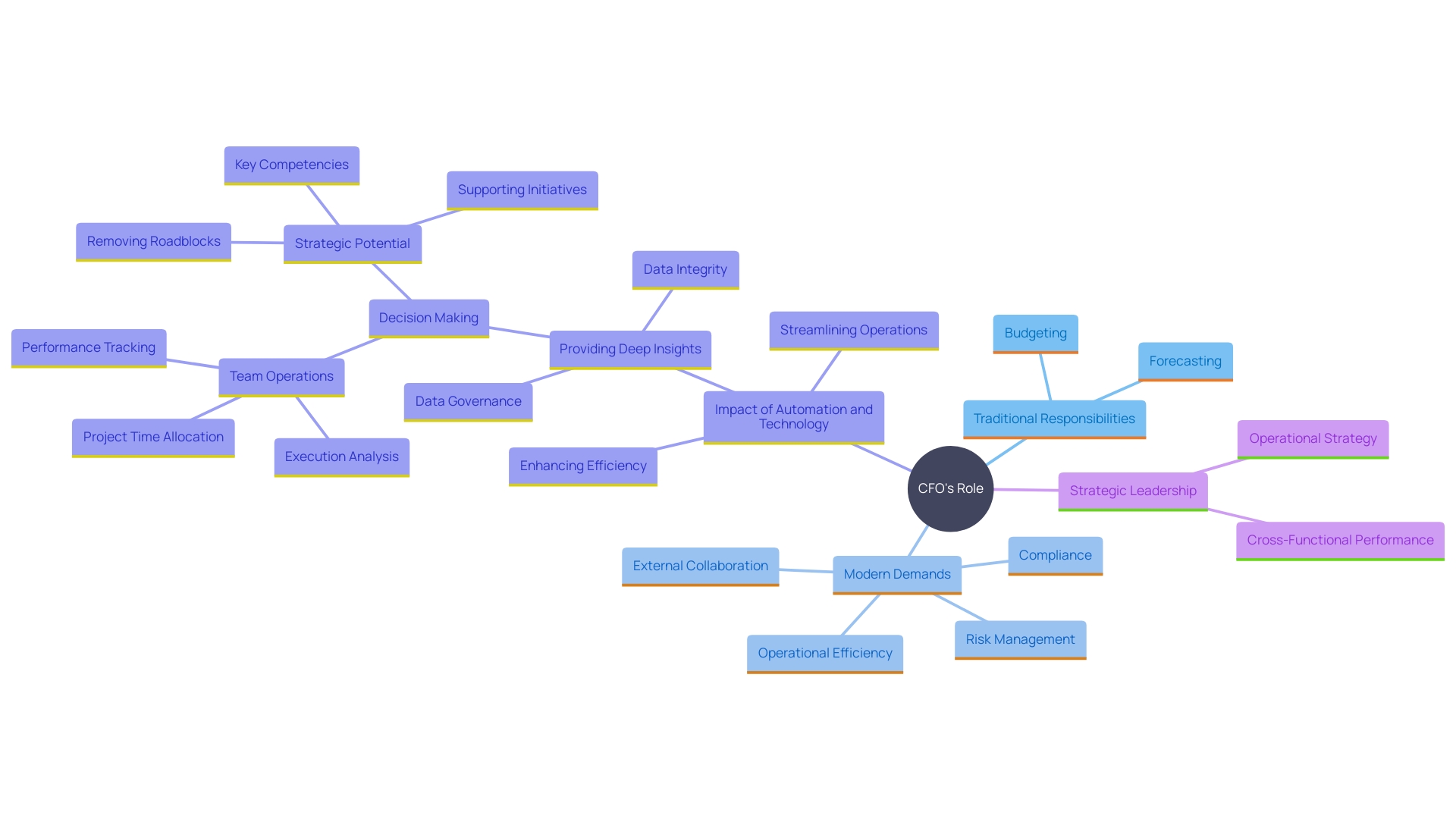
Strategic Business Partner: The CFO's Expanded Role
Today's CFOs have evolved far beyond traditional number crunching. They are now strategic partners, collaborating closely with other executives to drive company growth. Utilizing financial data, they identify opportunities for growth, cost savings, and revenue improvement, thereby supporting overall goals and increasing organizational agility.
A significant shift has been the adoption of AI and automated processes. According to a report, 8 in 10 financial leaders are embracing these technologies, which grant them time to focus on more valuable tasks and develop critical executive skills. However, only 49% are fully utilizing these capabilities. The skills leveraged through tech and automation include problem-solving, leadership, understanding of technology and systems, effective communication, and confidence.
Steve Hare, CEO at Sage, emphasizes the transformative role of technology: "Combining finance with technology gives financial leaders the chance to step beyond their traditional roles, guiding their businesses with both flexibility and deeper insight.". 'The success of financial leaders will increasingly depend on their ability to adapt, work together, and lead with clear purpose.'
Furthermore, financial leaders are now pivotal in customer acquisition and retention strategies, especially in competitive sectors like retail. As highlighted at the National Retail Federation annual conference, finance chiefs are expanding their roles into corporate strategy. Dayna Quanbeck, CFO and president of Rothy's, noted, "Financial leaders are not just defensive, record-keeping individuals—they're informing and driving strategy, capital allocation, and risk assessment."
The use of comprehensive data analytics also empowers financial executives to gain deep insights into their teams' operations. This data provides a clear picture of project timelines, resource allocation, and performance, enabling CFOs to identify key competencies and remove execution roadblocks. Ultimately, this positions them at the forefront of operational strategy and cross-functional performance within their organizations.
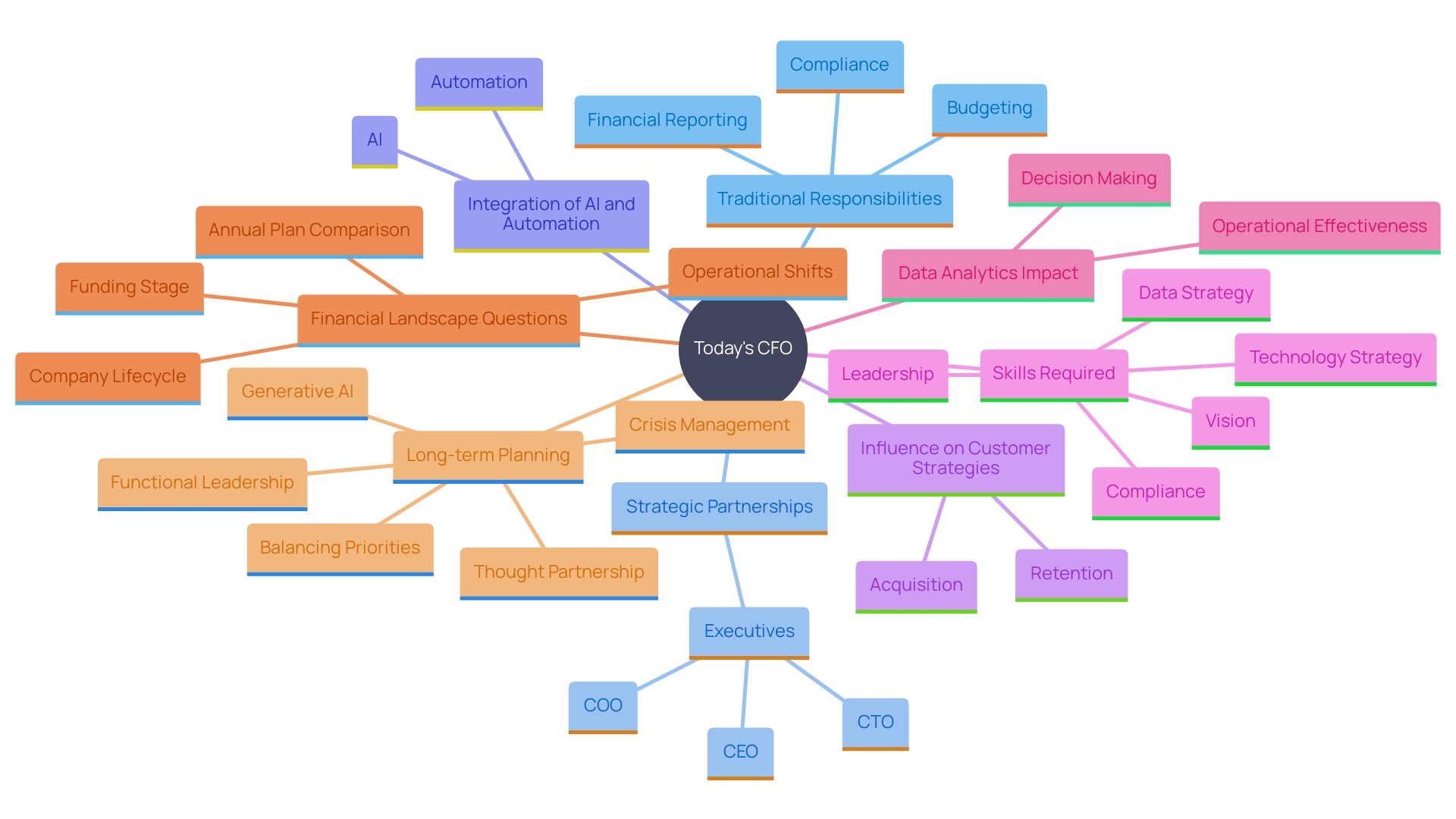
The Role of a CFO Consultant in Modern Businesses
CFO consultants are essential in guiding organizations through intricate economic environments, particularly during times of economic instability. They bring in-depth expertise to tackle specific business challenges, from improving cash flow management to enhancing financial reporting and developing strategic forecasts. This specialized guidance is essential for making informed decisions that drive long-term growth.
In times of market turbulence, such as the mini-slump that caused the S&P 500 index to drop by 7% in early August, financial leaders need robust strategies to navigate uncertainties. Despite political and economic instability, finance leaders remain confident in their ability to guide their organizations. A recent survey by Grant Thornton revealed that even as economic confidence dipped, 79% of chief financial officers expected net profit growth over the next 12 months—a 10-quarter high.
Furthermore, the rising cost of living and borrowing has heightened the need for guidance on money matters, underscoring the necessity for efficient economic leadership. Chief Financial Officers are now crucial in developing customer acquisition and retention strategies, reflecting their broadened responsibilities beyond conventional money management. According to Dayna Quanbeck, CFO and president of Rothy’s, “CFOs are not just defensive, record-keeping individuals; they are now informing and driving strategy, capital allocation, and risk assessment.”
Furthermore, the survey highlighted that 66% of finance leaders plan to increase their spending on IT and digital transformation, the highest in 15 quarters. This investment underscores the belief that technology can enhance organizational efficiency and effectiveness, crucial for thriving amid ongoing economic challenges.
CFO consultants provide the necessary expertise to implement these strategies, ensuring organizations can withstand economic pressures and seize growth opportunities.
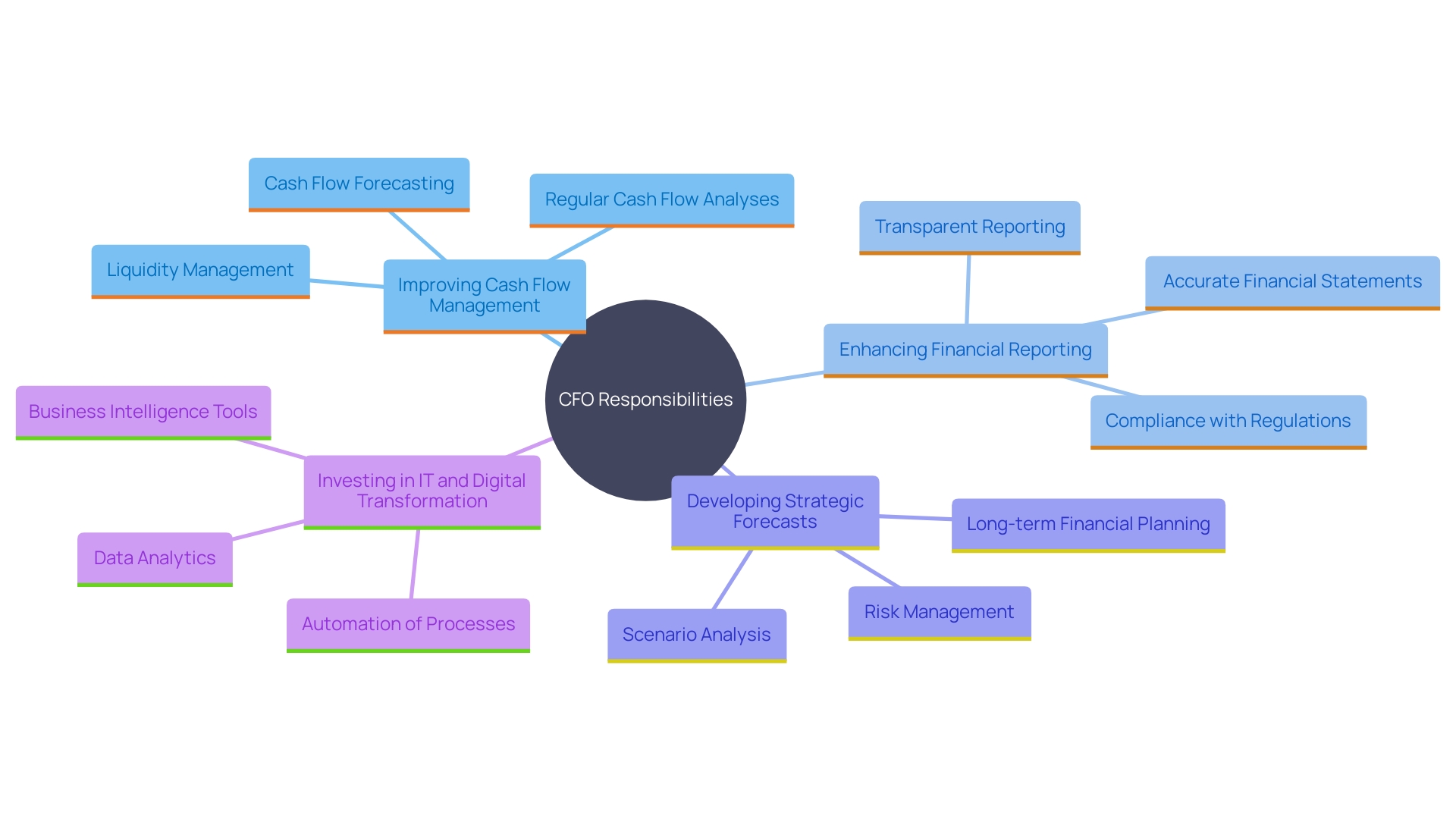
Benefits of Hiring a CFO Consultant
Engaging a CFO consultant offers several transformative advantages for businesses. These experts provide an objective perspective that helps organizations identify inefficiencies and implement best practices. For instance, Lincoln Financial Group's transition from legacy platforms to a cloud-based architecture significantly reduced operating costs and modernized their operations, addressing complex challenges in a short timeframe.
CFO consultants also play a critical role in interim management during transitions, ensuring continuity in operational activities. Effective leadership during such periods can steer organizations through change, inspire confidence, and facilitate resilience among employees. This was evident in a McKinsey Global Survey where 66% of successful company reorganizations had clear communication plans, emphasizing the importance of transparent leadership.
Moreover, employing a CFO consultant can result in enhanced economic well-being. According to a Small Business Administration study, only about half of startups endure the first five years, often due to a lack of a solid monetary strategy. A CFO provides invaluable expertise by creating monetary strategies that align with organizational objectives, preparing precise fiscal forecasts, and overseeing cash flow.
Additionally, a CFO consultant enhances strategic alignment and organizational resilience. They help identify key performance indicators (KPIs) and implement systems to track and analyze financial metrics effectively. This data-driven strategy enables organizations to make informed decisions, optimize operations, and adapt quickly to market changes. With nearly two decades of evolving responsibilities, modern CFOs now contribute significantly to strategic, operational, and cross-functional business areas, ensuring long-term success and sustainability.
Ultimately, engaging a CFO consultant is a strategic move that fosters growth, mitigates risks, and strengthens the overall financial framework of an organization.
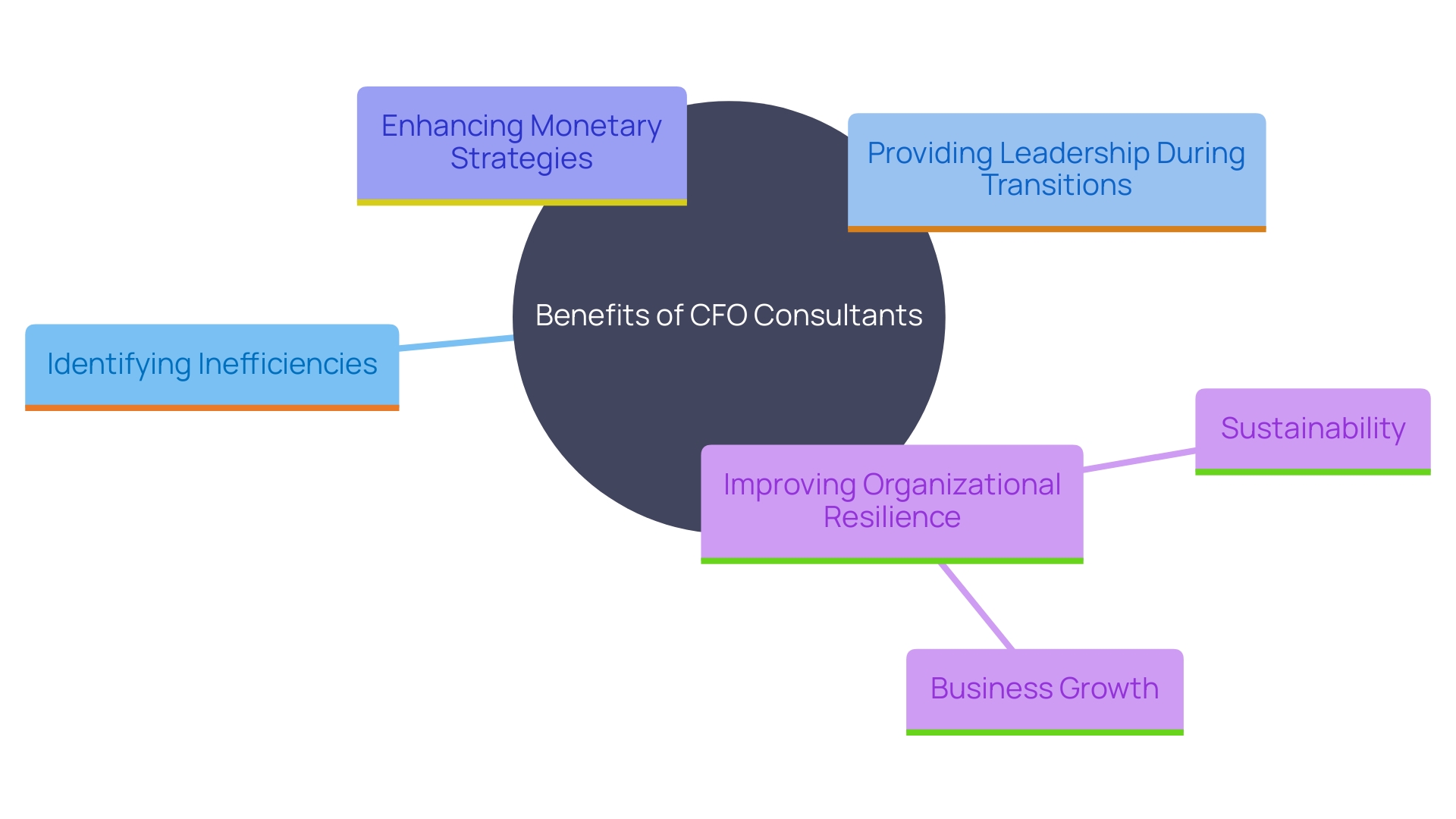
Conclusion
The transformation of the CFO role marks a significant shift in the landscape of business leadership. Today's CFOs are not merely financial overseers; they are strategic partners essential for steering organizations through complex financial terrains. The integration of technology, particularly AI and automation, has empowered CFOs to enhance their influence and provide deeper insights that align financial goals with broader business strategies.
Modern CFOs face a multitude of responsibilities that extend well beyond traditional accounting. They are tasked with driving operational efficiency, managing risk, and ensuring compliance in an increasingly complex regulatory environment. By collaborating with various stakeholders, CFOs can align financial strategies with long-term organizational goals, ultimately fostering a culture of high performance and continuous improvement.
Moreover, the expanded role of the CFO as a strategic business partner underscores their importance in driving growth initiatives and optimizing resource allocation. With the ability to leverage comprehensive data analytics, CFOs can identify opportunities for cost reduction and revenue enhancement, positioning themselves as pivotal figures in customer acquisition and retention strategies.
Engaging CFO consultants further enhances an organization's capacity to navigate financial challenges and seize growth opportunities. These experts bring objective insights, facilitate transitions, and develop robust financial strategies that promote resilience and sustainability. As organizations continue to evolve, the strategic contributions of CFOs and their consultants will be crucial in ensuring not only financial stability but also long-term success in a dynamic business environment.




